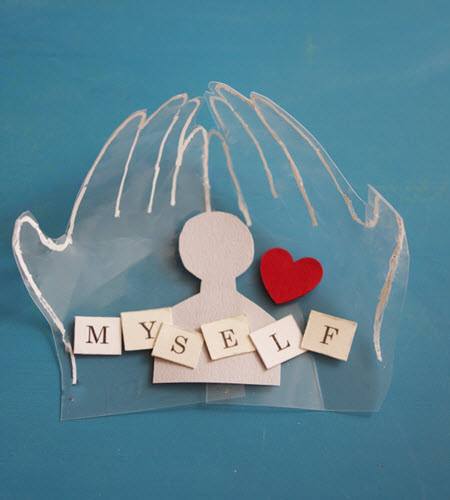Self-esteem and self-acceptance: These are NOT the same thing.
You’ve heard these terms and likely used them interchangeably. Guess what. They’re not.
Because self-esteem is conditional, its pursuit is flawed. Basing our self-worth on dependencies, such as others’ approval, on our performance, or on outcome success, drives us to feel anxious, depressed, or unhappy.
According to Albert Ellis, the father of Rational Emotive Behavior Theory, “Self-esteem tends to motivate you to succeed and to win others’ approval. It gives you an interesting, preoccupying game of constantly comparing your ‘deeds’ and your ‘self’ to those other people. It often helps you impress – which has practical value, in many instances. It may help preserve your life– such as when you strive to make more money, for egoistical reasons and thus aid your survival by means of money.”
It can, arguably, improve our productivity and achievements, urge self-actualization, drive us to improve and develop… but at a cost.
Trying to gain self-esteem has many more disadvantages than perks.
It can become an “obsession” that tends to preempt a large part of your life.
You seek status instead of seeking joy. Even when you impress others, you tend to realize that you do so partly by acting and falsifying your talents. You consequently look upon yourself as a phony.
When we focus on seeking self-worth, we tend to magnify our defects, liabilities, and failings. We become overly critical and judgmental, self-centered vs. problem-centered, and hence – unhappier. We focus on the “pseudo-problem of proving yourself instead of finding yourself.” It all may push us into depression, aggression, and substance abuse.
In other words, seeking to boost our self-esteem tends to interfere with our life and happiness.
 The silver lining, according to Ellis, is that there is an alternative!
The silver lining, according to Ellis, is that there is an alternative!
Instead, try this on for size: Unconditional acceptance – of ourselves, others, and the world – as a better way to feel good and have a fulfilling life.
Unconditional acceptance – which simply means that “the individual fully and unconditionally accepts herself whether or not she behaves intelligently, correctly, or competently and whether or not other people approve, respect, or love her.”
With low self-esteem, we often evaluate ourselves negatively. If we do something bad, we regard ourselves as bad people. “Blaming or praising yourself, the whole individual, for few of your acts is an unscientific over-generalization.”
How you’ve come to see yourself determines how you feel about yourself. With self-acceptance, if we do something bad, we just understand that we have acted badly. That’s it. No unfavorable judgment. No feeling bad. Hence, no fluctuation in self-worth.
The esteem (or value) you assign yourself is a very slippery slope.
I mean, what valuation scale are you using? Is there even one for rating humans?
You think you measure up? You think you don’t? Without a scale to which to compare, how would you even know?
You feel badly because you made a mistake or someone is disappointed in you.
You feel terrible when you don’t perform like you think you should.
You feel dejected and sad, because you aren’t where you think you’re supposed to be in your life or have what you believe you’re supposed to have by now.
Measuring ourselves in this manner is not possible; and because we’ve all been raised to “be better than,” we’ve been set up for failure… no matter how we perform, what we have, or who we are!
Fortunately, I’m here to tell you there’s a work-around.
Let me show you how to explode the notion of “self-esteem” and stop chasing valuation that doesn’t exist in the first place. And it’s not as hard as you think!
Based on the above presumptions, I employ Rational Emotive Behavioral Theory (REBT) which “recommends that people better resist the tendency to rate their ‘self’ or ‘essence’ and stick with only rating their deeds, traits, acts, characteristics, and performances.” The distinction between judging our behaviors and rating ourselves makes all the difference in the world.
Therefore, the main principle of REBT is linked to the realization that we don’t really need what we want. If we don’t get what we want, we will still be ok.
So, let me show you how to stop obsessing on self-esteem, as it is a flawed goal. It is built on dependencies and doesn’t produce the promised outcomes. When you learn to focus on unconditional self-acceptance, you’ll start focusing on mending just the behavior, not “your totality, your you-ness.” And that’s a more constructive way to be happy, fulfilled, less anxious, or just be… you.
How good it feels to be able to accept criticism, tolerate rejection, and face whatever comes your way with assurance and confidence!
Avoid the perils of “self-esteeming” and truly accept yourself… ALL of yourself!
I will help you discover who you really are… to feel comfortable in your own body, to like yourself again, and enjoy being YOU!
I use cognitive behavioral therapy (specifically rational emotive behavior therapy) techniques to help you make the switch from self-judging to self-accepting and achieve the great feelings that come with it.
We’ll talk about how you see yourself, discover what’s been holding you back from experiencing your true self, and learn how to shift far away from self-rating and how to appreciate your efforts rather than castigate yourself because of them!
You matter. You deserve it. Your life satisfaction is worth it.
The search for the “true self” is a passion of mine. I thoroughly enjoy helping my clients on this journey and love witnessing them succeed!
I’m sure that you are a unique and wonderful individual just waiting to be seen!
Let’s talk. Call me at (941) 544-4822 to schedule your complimentary phone consultation today.

